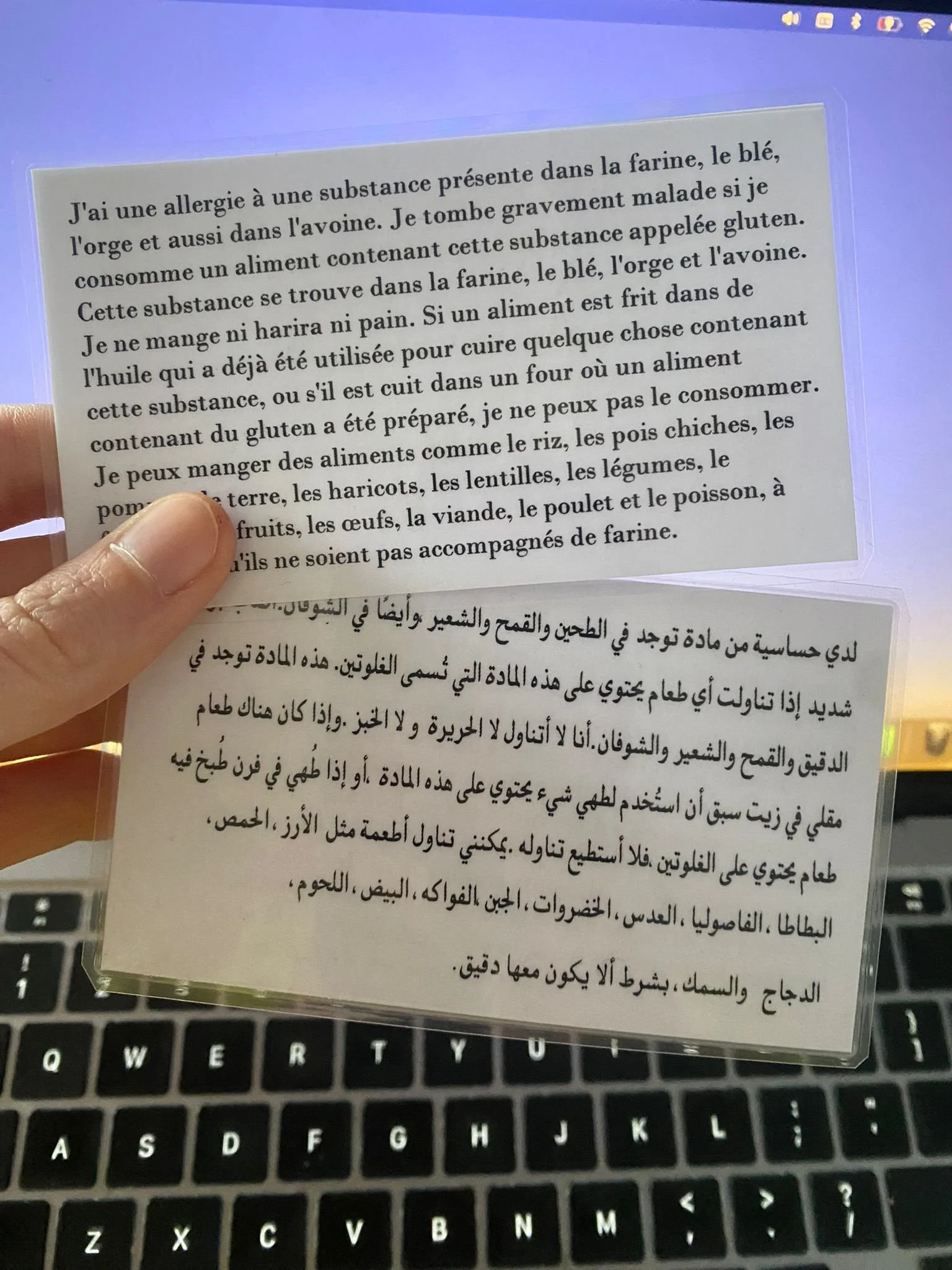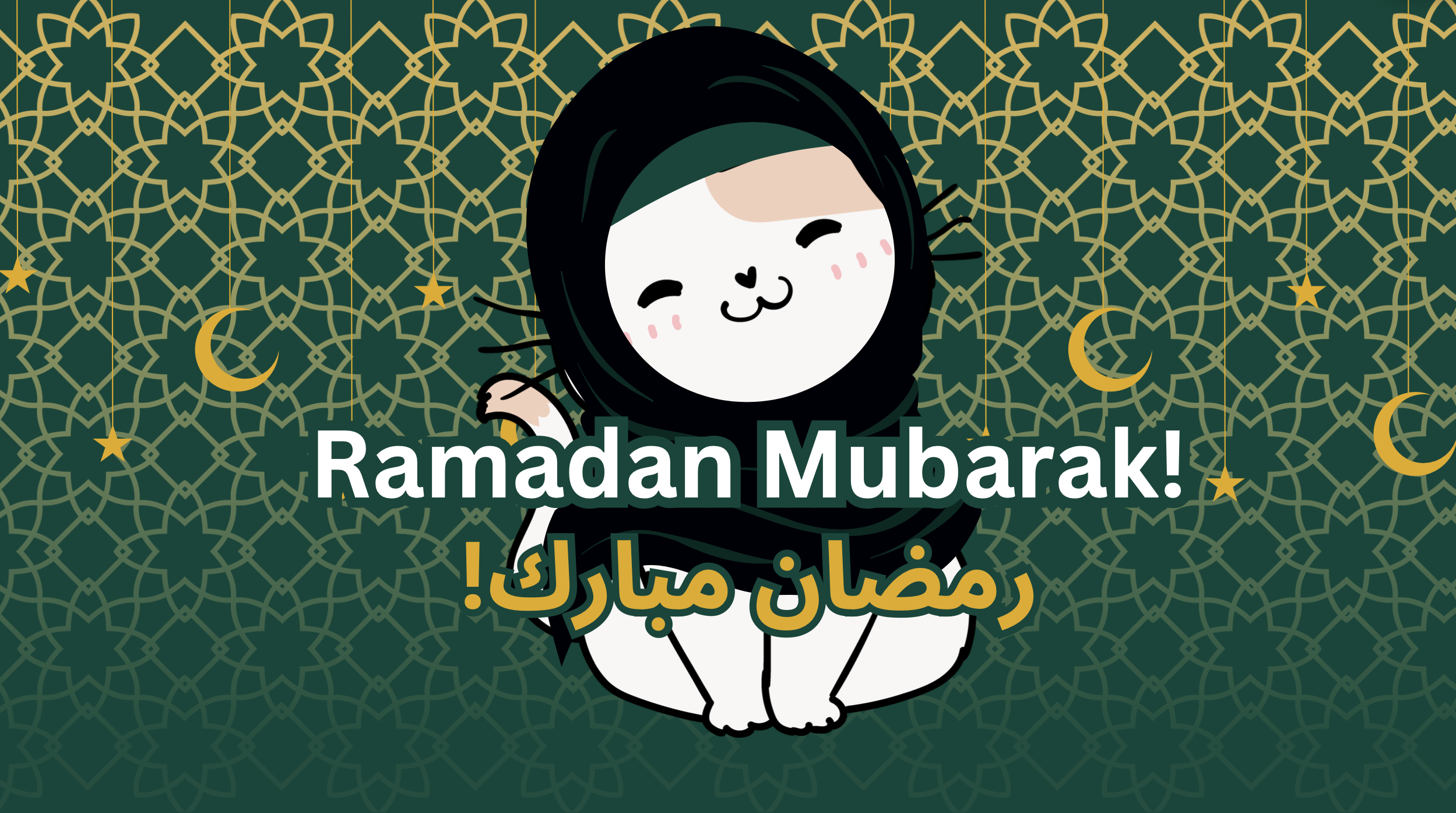"Studying Abroad with Celiac" by Claire Fink
CLAIRE: OK, this is Claire Fink. I’m here with Fitz [Caroline Fitzpatrick]. It’s February 5th [we’ve been in Morocco for a month now], and we’re talking about her experience with celiac in Morocco. So, my first question is: what has been the most challenging aspect of dealing with your condition here?
FITZ: Good question. So, the most challenging aspect is probably the language barrier and the lack of awareness about celiac because I feel like in the US more people are familiar with the disease than I’ve experienced here. A lot of people just aren't familiar with it; there’s probably just way less people with celiac. And yeah, and also the language barrier because I can say ‘sans gluten’, but I don’t know any Arabic or Darija so that makes it tough to explain it and explain cross-contamination and everything like that.
CLAIRE: What has helped you navigate this the most?
FITZ: So Amideast gave me allergy cards, which [are] really nice. [They say] in French and in Arabic and [in] really good detail what celiac is, how restaurants can avoid cross contamination so that I don’t need to explain myself and everything. I just show them like the allergy card and then they can read it and be like: OK, I got you. Also, the other students because all the other students are really - like, when we go out to a restaurant, they will defend me and be like, “she cannot have gluten,” and they will all stand up for me and it is really sweet.
CLAIRE: Have you found good gluten-free food/restaurants that are very accommodating that are outside of your host family?
FITZ: Pretty much like they’re a lot of traditional Moroccan dishes that are actually gluten-free like tajine, bissara - which is like a fava bean soup. A lot of the dips. There’s a bunch of like naturally gluten-free Moroccan dishes, which is really nice. They’re all served with a side of bread like khubz (خبز), just can’t have that! So pretty much like any Moroccan restaurant is chill like that.
CLAIRE: And I know I’ve heard you talking about some gluten-free grocery stores/sections in grocery stores; are those few and far between, or are they pretty easy to find like gluten-free snacks and stuff for you to bring to class etc.?
FITZ: Well, my go to snacks are dates, nuts, yogurt, and oranges. Those are also good, so gluten-free. In Marjane and in most grocery stores there’ll be a gluten-free section that’ll have this German brand called Schär, It’s a gluten-free German brand that’s there, but it’s just really expensive. It’s like really good, but really expensive. Rice cakes are a cheap alternative.
CLAIRE: When you say expensive, like what is the conversion from dirhams to US dollars typically? Is it average gluten-free American prices or is it inflated?
FITZ: It’s probably - it probably equates to the same as American prices. Yeah I think the gluten-free bread here would probably be the same as gluten-free bread in the US, or maybe even cheaper, but it just feels like way more because in comparison to the glutenous bread here. It’s like you go to any restaurant and you just get free bread, like free bread everywhere, or one dirham for bread. It’s just super cheap and accessible and then the gluten-free bread will be like 100 times more expensive. So yeah, relative to the US, it’s not too bad, but then when you’re here for like four months that adds up, and yeah it’s just too much.
CLAIRE: What do you wish you knew about having celiac here before you arrived in the country?
FITZ: I wish I knew that I could get an allergy card sooner because I didn’t get it until like a month in here. The first two weeks here, I was glutened at restaurants. Bummer. Oooof., okay. I wish I knew that I could get an allergy card. I definitely wish that I got that right away when I got here. And yeah, just also understanding that a lot of people here don’t know what celiac is like. They don’t even know what it is. They’re not familiar with the allergy, what it means to be [gluten-free], what a gluten-free diet is, what is gluten, everything like that.
CLAIRE: And finally, what advice do you have for any future prospective Amideast student that also is gluten-free/has celiac/related disease?
FITZ: It’s definitely not too debilitating. There is still plenty of food to eat. You can - unless if you’re vegetarian then that would be hard, because I feel like a lot of what I eat is like meat and veggies - so the hardest thing is just kind of trying to find a carb or something starchy. So, if you can just find rice or corn or potatoes, or something like that would be really good. But yeah anyways, I wouldn’t let the disease deter you away from going on this program because it’s great, and I’ve only had a reaction two or three times, which is still a bummer. But a lot of the falafels have bulgar in them so be careful when you get [falafel], watch out. Be careful - because I was like “oh falafels are totally gluten-free.” No, nah. But stay safe out there. Get tajine, tajine rocks.
CLAIRE: Any specific type of tajine?
FITZ: Chicken, olives, lemon, but no bread on the side or just give the bread to your friends because they will appreciate it.
CLAIRE: Sounds deliciosa. I don’t know how to say that in Arabic, but I should probably learn.
FITZ: Bnin (بنين)
CLAIRE: Oh of course! Broooo.
FITZ: Hit a bnin!
CLAIRE: Also, note, say “L-makla bnina” ( لماكلة بنينة) to your host mom and she will appreciate it. It means the food is delicious. Yeah OK, thanks for watching, listening, reading… bye!
FITZ: B’salama (ب السلامة)!
CLAIRE: B’salama!
Claire Fink is a student at Fordham University and studied abroad in the Spring 2025 on Amideast’s Area & Arabic Language Studies program.






